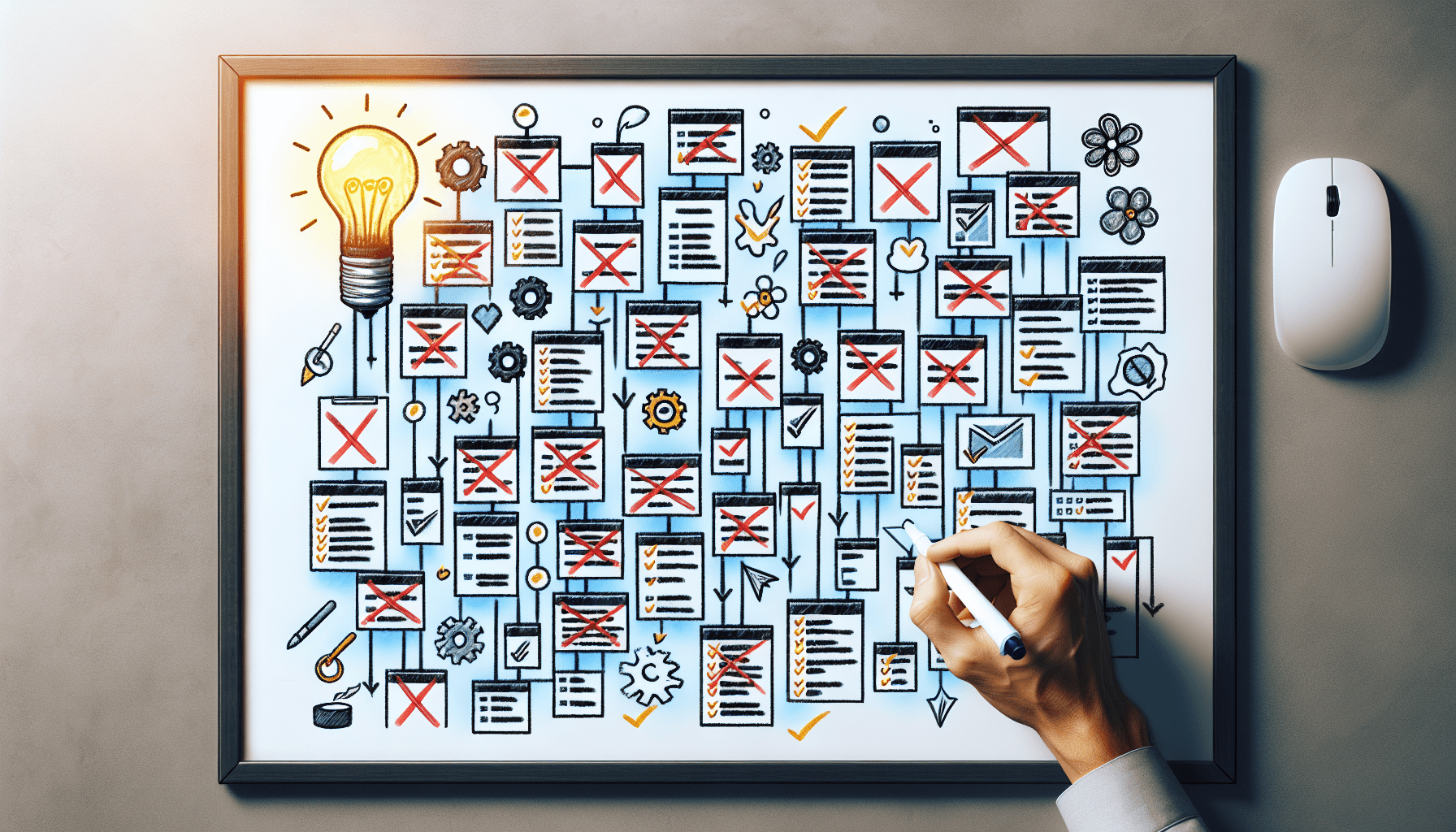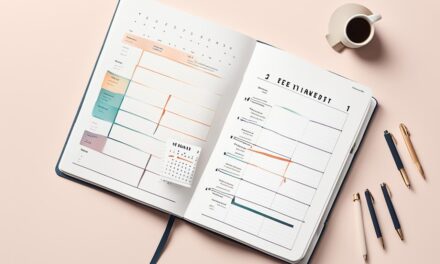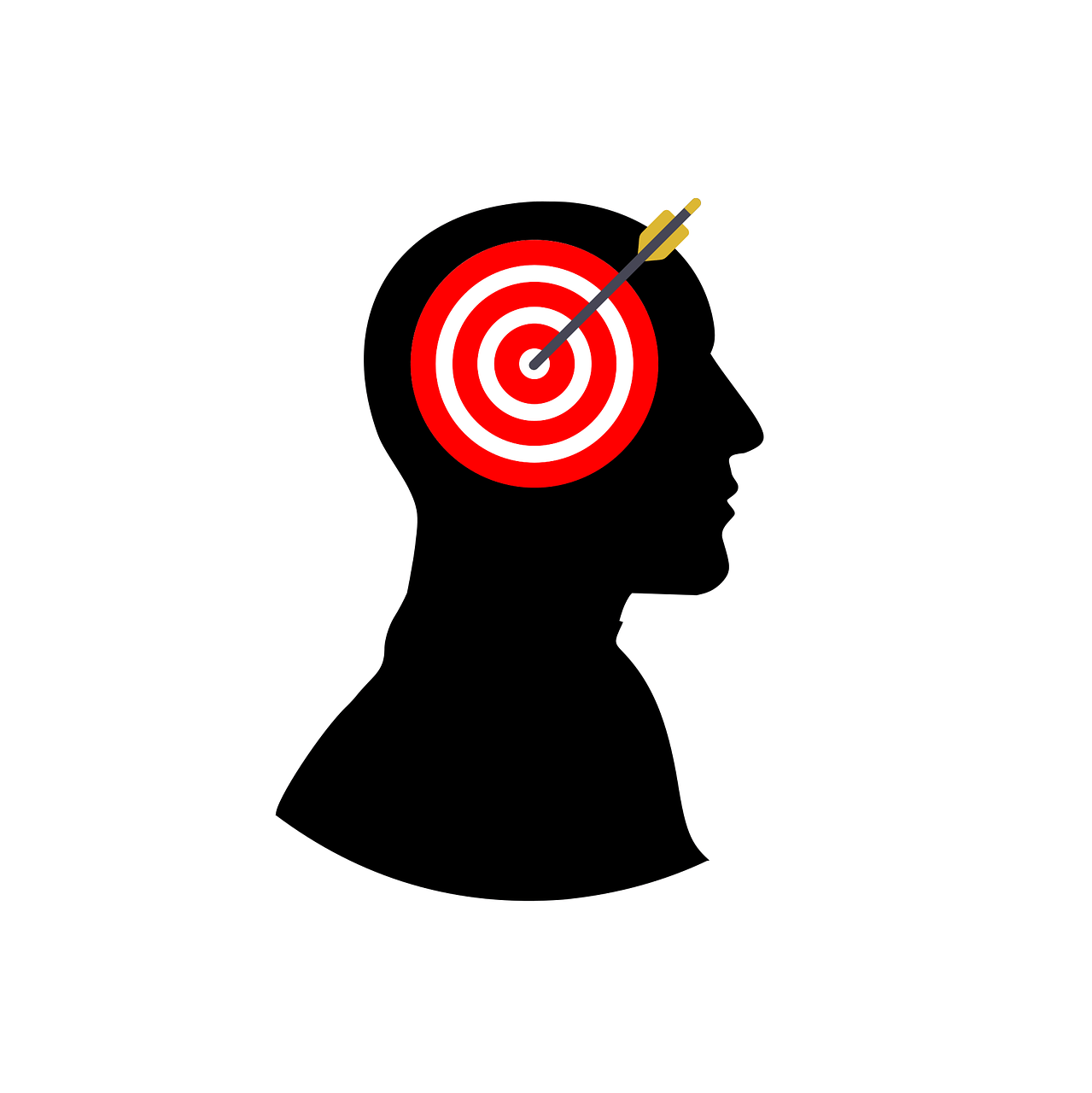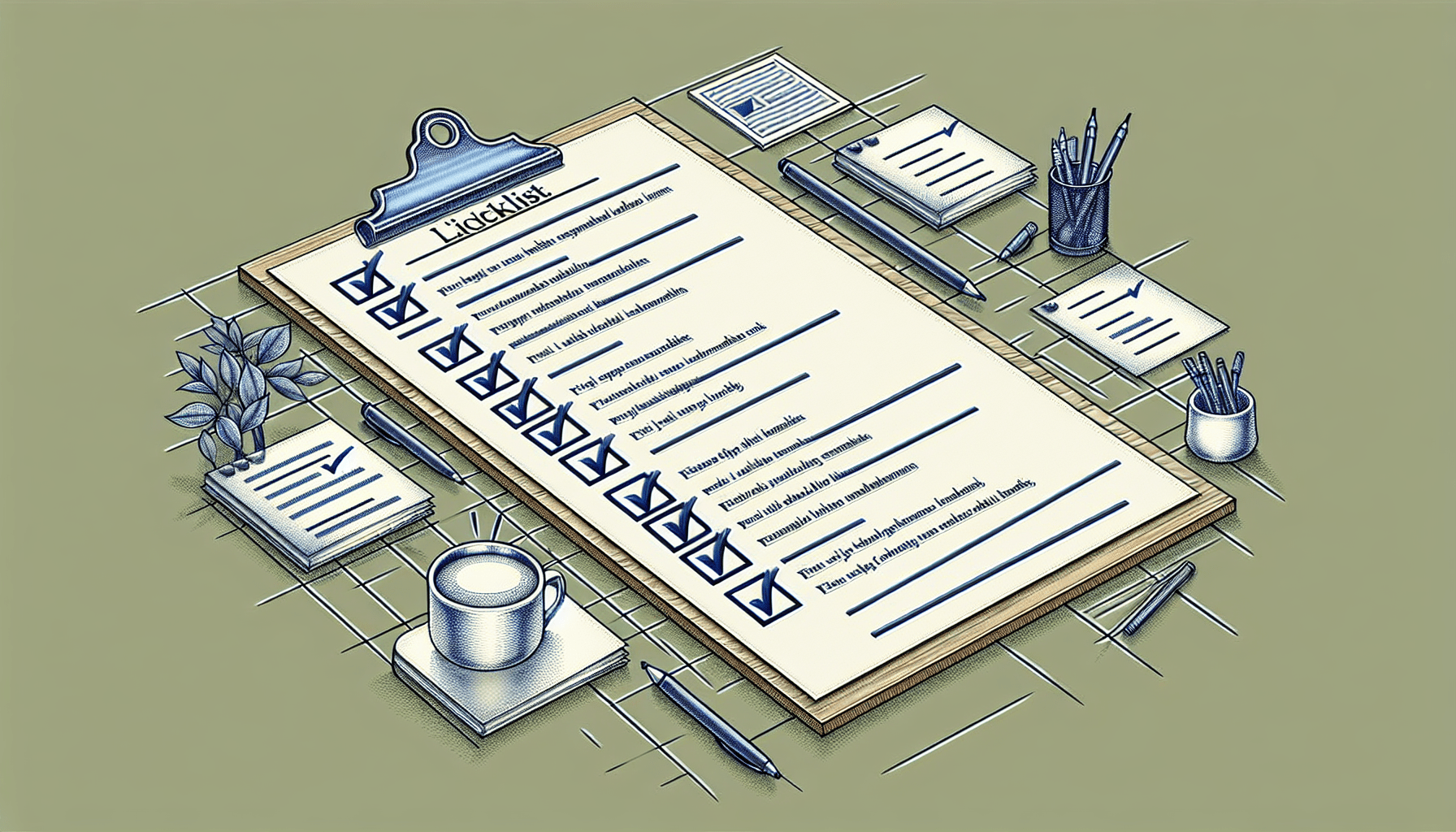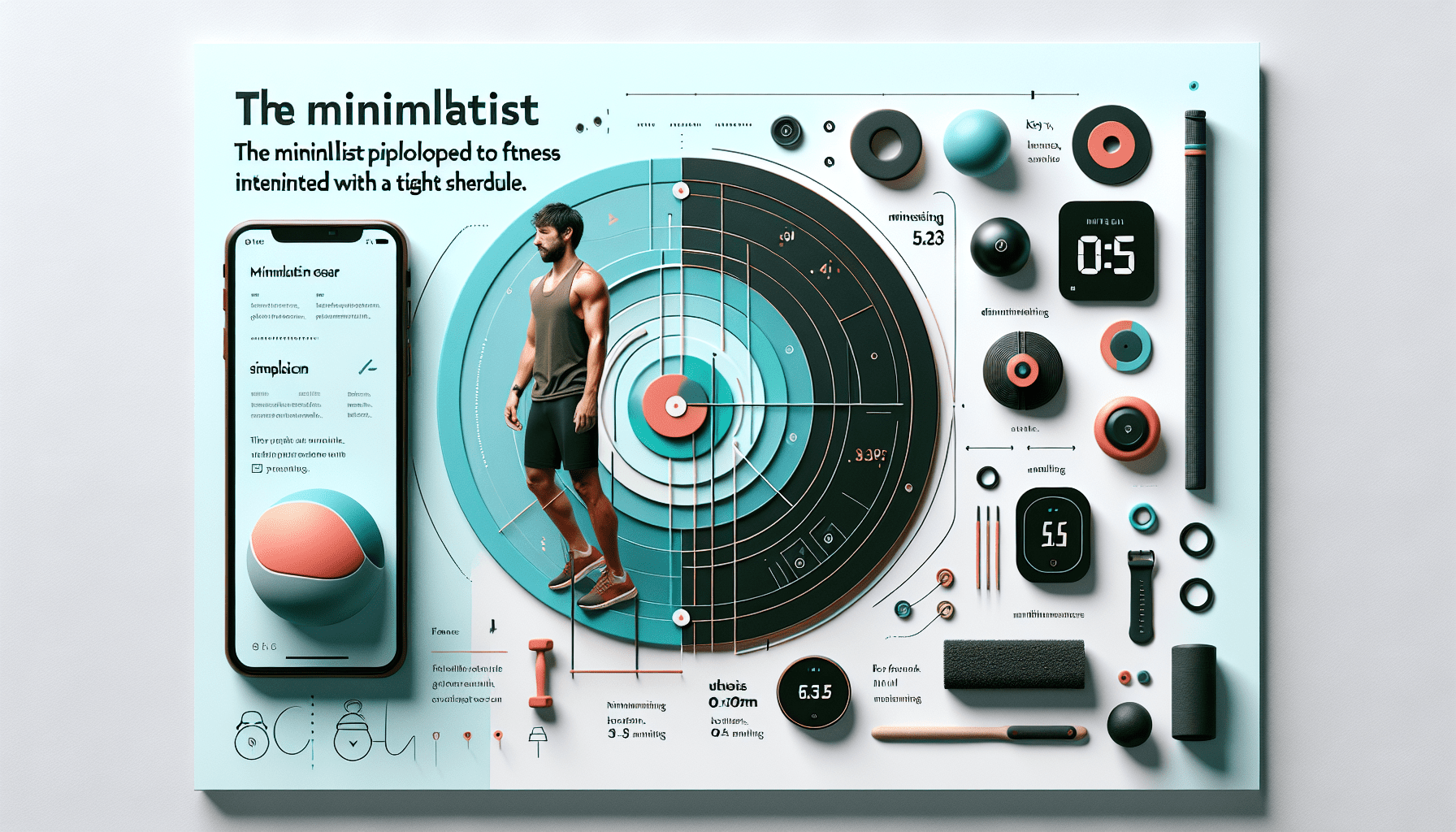
Minimalist Tools for Mastering Time Management
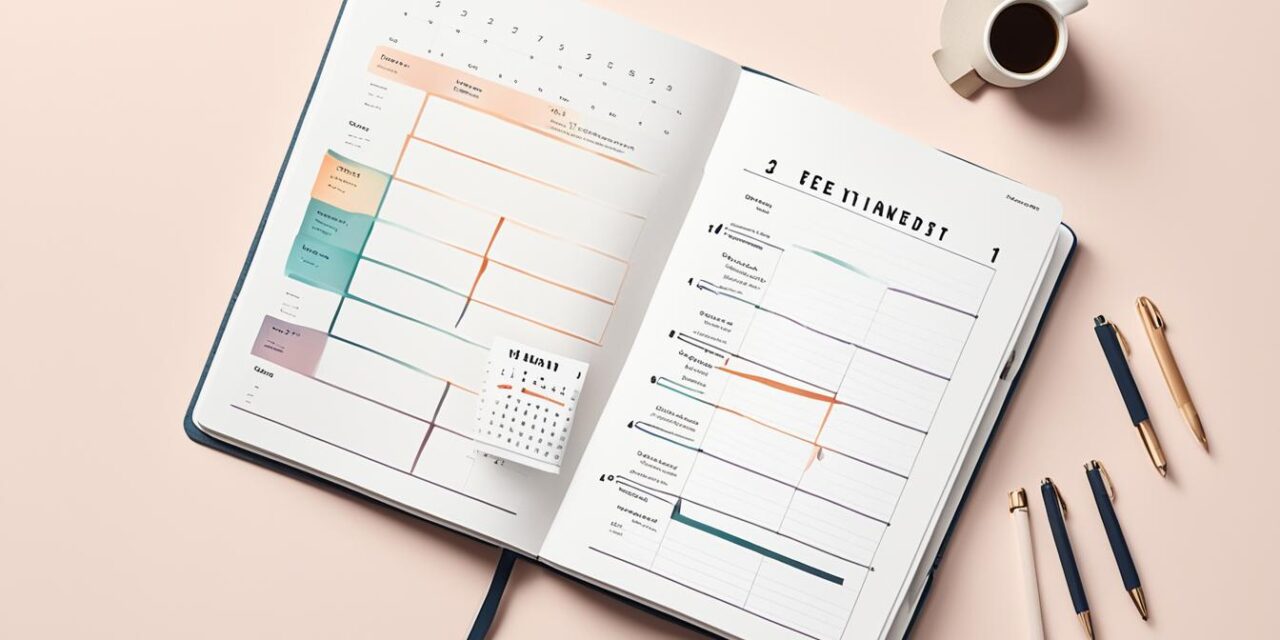
Do you often feel overwhelmed by the demands of work and personal life? It seems like there aren’t enough hours in the day. How can we escape this cycle and live a more peaceful, productive life? In today’s world, with so many distractions, learning to manage time well is crucial for career growth and well-being. By living minimally and planning efficiently, we can make our workdays simpler. This lets us focus on what’s important and pursue our goals with more confidence.
Starting to manage time better often means choosing the right tools. Surprisingly, simplicity and minimalism can help us be more productive. What if the key to managing time well is not doing more, but doing less, but smarter?
There are tools designed to make us more efficient and focused on what’s important. Tools like Jira help with managing projects and improving development. Monday.com makes working with a team easier. ClickUp and Chanty offer great time tracking and task management features. Scoro and Harvest help with tracking time and sending invoices. Zapier automates business tasks.
Key Takeaways
- Minimalist time management boosts both work and personal productivity.
- Choosing the right tools can make workflows smoother.
- Tools like Jira, Monday.com, ClickUp, and Chanty are versatile for different needs.
- Features in tools like Time Doctor and Toggl Plan give insights into how productive we are.
- Automation tools like Zapier make business tasks easier, giving us more time for important work.
What Is Minimalist Time Management?
Minimalist time management is about controlling and using time well to boost productivity with simplicity. It means focusing on the most important tasks and cutting out the rest. This approach uses prioritisation to make the most of our daily activities.
This method helps us choose which tasks to do, following the idea of a simplified schedule. By cleaning up our routines, we can do more with less stress. Using minimalist time organisation helps us know what’s really important, making every minute count.
Knowing our natural rhythms is key to this method. Many of us are more creative in the morning and better at routine tasks in the afternoon. Understanding this can really help us work better and stay focused.
The minimalist lifestyle means having a tidy space, which lowers stress and helps us concentrate better. It makes us focus on just the important tasks and avoid making too many decisions. This means doing the most important work first each day.
| Practices | Benefits |
|---|---|
| Pre-planning the workday | Boosts focus and motivation |
| One-Minute Rule | Maintains efficiency by completing small tasks immediately |
| Batching time | Reduces distractions and maximises focus |
| Setting artificial deadlines | Encourages timely completion of significant tasks |
For nearly a decade, minimalism has shown us how to manage time well. Efforts like Becoming Minimalist and The Hope Effect prove its success. Just 10 minutes each morning or evening for planning can greatly improve our ability to follow a simplified schedule.
Importance of Time Organisation
Effective time organisation is key to our work life. It helps us meet our goals and reduce stress. Let’s see how it helps us stay on track and manage our time well.
Meeting Deadlines
Meeting deadlines is crucial for success. Bryan Clayton, CEO of GreenPal, says setting clear goals helps with time management. This leads to finishing tasks on time.
A UK study found people waste almost 2 hours daily doing nothing. This adds up to nearly a month lost each year. Using Time Optimisation can cut these losses, making sure we meet deadlines and stay within budget. Laura Wasser, a family law expert, compares good time management to having a skilled lawyer in court. It’s vital for reaching career goals and building a strong reputation.
Reducing Stress
Time management isn’t just about doing more; it’s about doing less with less stress. It helps us focus on what’s important. This reduces stress, which is key to avoiding burnout, as experts say.
Valeri Gervaziev, Founder & CEO of Deepwrk, believes being organised with time is crucial for staying mentally well and productive.
Medical studies show the benefits of good time management. The Mayo Clinic found cutting a doctor’s workload by 10% can lower medical errors by 5%. Hospitals that manage time well have cut patient wait times by 20%, says the American Hospital Association. These facts highlight how time management boosts productivity and quality of life.
| Statistics | Details |
|---|---|
| Monthly Wasted Time | 2 hours per day doing nothing equates to almost a month wasted annually |
| Reduction in Medical Errors | 10% reduction in physicians’ workload can lead to a 5% drop in medical errors |
| Patient Wait Time Reduction | Hospitals can reduce patient wait times by 20% with effective time management |
Prioritisation Techniques for Simplified Schedule
Mastering time management is key to a simpler schedule. By using proven techniques, we can make our schedules more efficient and boost productivity. The Eisenhower Matrix and the ABC Method are two top methods for this. They help us plan our time better.
The Eisenhower Matrix
The Eisenhower Matrix comes from President Dwight D. Eisenhower. It’s a key tool for prioritising tasks. It sorts tasks into four areas based on urgency and importance. This helps us manage our time better.
- Urgent and Important: Tasks that need doing right away, like urgent deadlines.
- Important but Not Urgent: Tasks crucial for our long-term goals but often missed in planning.
- Urgent but Not Important: Distractions that need quick action but add little value to our goals.
- Not Urgent and Not Important: Tasks that we should drop to save time.
This framework helps us see which tasks need our focus now and which can wait. It leads to more balanced and thoughtful planning.
ABC Method
The ABC Method is another great way to prioritise tasks. It groups tasks by their importance:
- A: Tasks that are very important and must be done.
- B: Tasks that are important but can wait.
- C: Tasks that are not important and have little effect on our goals.
This method helps us plan our time well and manage our tasks better. It fits with effective time management by focusing on tasks that help us reach our main goals.
Using these techniques every day can make us more productive and less stressed. Managing our time well lets us control our schedules and live a balanced, happy life.
Leveraging Time Blocking for Efficient Time Planning
Time Blocking changes how we plan our days. It lets us set specific times for tasks. This helps us avoid interruptions and keep a steady flow of work.
In a study, Time Blocking increased productivity by at least 20% through better focus and reduced procrastination.
Tools like Google Calendar, Microsoft Outlook, and Apple Calendar are key for Time Blocking. They help us stay on track. Apps like Trello, Todoist, and Clockify also help by prioritising tasks and tracking time.
For those who like writing, planners like the Bullet Journal, Passion Planner, and Panda Planner are great. They let us put our schedules into action.
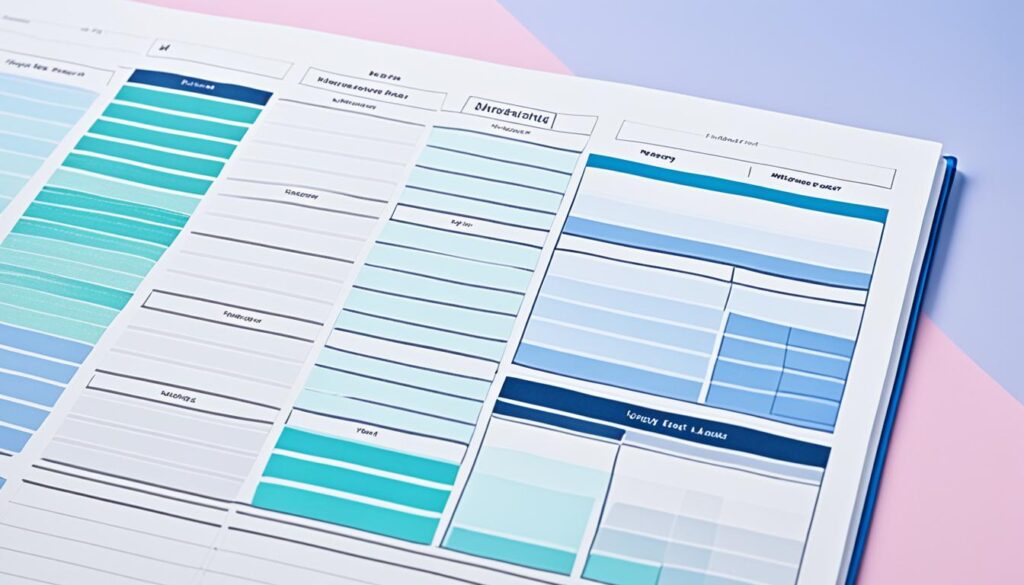
Time Blocking can cut productivity by up to 40% if we keep switching tasks. It’s important to have set times for deep work. This avoids too many changes.
Short breaks in our Time Blocking schedule keep us energised and stop burnout. This way, we keep a good balance between work and rest.
| Tool Type | Examples | Key Features |
|---|---|---|
| Digital Calendars | Google Calendar, Microsoft Outlook, Apple Calendar | Seamless integration, real-time updates, notifications |
| Specialized Apps | Trello, Todoist, Clockify | Task prioritisation, time tracking, project management |
| Physical Planners | Bullet Journal, Passion Planner, Panda Planner | Tactile experience, customisable layouts, goal setting |
Using Time Blocking helps us plan our days in a way that suits us. It lets us set achievable goals and manage our time well. This approach helps us avoid the ‘planning fallacy’ and adds buffers for unexpected delays.
Technology Tools for Time Optimisation
Using the right technology tools can change how we manage our time. By picking tools for tracking time and automating tasks, we can make our daily tasks easier, increase productivity, and make better decisions about how we spend our time.
Time-Tracking Apps
Time-tracking apps are key for seeing how we use our time. Apps like Harvest and Toggle help us see what we do all day. They show us where we can do better. These apps give us clear insights into how we spend our time.
With these tools, we can plan our days better and focus on what’s important. They help us manage our time well.
Automation Tools
Automation tools make our work easier by doing the same tasks over and over. For instance, Slack’s Workflow Builder and Zapier can sort emails or set up reminders for us. By adding these tools to our work, we work better and more efficiently.
These tools help us save time and focus on creative and strategic tasks. They make our work flow smoothly.
“Time spent on hiring is time well spent.” – Robert Half
Using automation tools and time-tracking apps helps us have a structured and productive day. They work well with other important tools like calendars and task apps. This keeps us organised and connected.
| Device | Utility | Examples |
|---|---|---|
| Computer/Phone | Essential for productivity | Desktop, Smartphone |
| Time-Tracking Apps | Monitor activity and efficiency | Harvest, Toggle |
| Automation Tools | Automate repetitive tasks | Slack Workflow Builder, Zapier |
| Task Management Apps | Keep track of tasks | ClickUp, Asana, Trello |
| Physical Productivity Tools | Additional support | Wireless Noise-Cancelling Headphones |
Using these tools well can help us balance work and personal life. This shows how time optimisation and modern technology can work together.
Mindful Breaks to Boost Productivity
Taking mindful breaks can make us more efficient and happy at work. Simple techniques help us stay focused and avoid burnout.
The Pomodoro Technique
The Pomodoro Technique is a top way to stay productive. It means working for 25 minutes, then taking a five-minute break. This keeps us on track and cuts down on distractions.
Studies say this method can make us 25% more productive. The best mix is 52 minutes of work and 17 minutes of break. This matches our natural focus span, keeping us performing well all day.
Mindfulness Exercises
Mindfulness exercises are also great. Walking for two minutes every hour can cut the risk of early death by 33%. Looking at nature pictures lowers stress and helps us relax.
Research from Hiroshima University found that cute animal pictures make us more productive.
Mindfulness eases stress and sharpens focus. Meditation increases focus and relaxation. Starting with just one minute a day helps. Short naps, 20-30 minutes, boost alertness and productivity, especially in the afternoon.
Using mindful breaks and techniques like The Pomodoro Technique makes work better. We get more focused, productive, and less stressed.
Batch Processing for Similar Tasks
Using Batch Processing is a key way to boost productivity. It means doing similar tasks together. This saves our brain power and cuts down on the tiredness from switching between tasks often. It makes our time more focused and productive.
Studies show it takes about 23 minutes to get back into focus after a distraction. By using Batch Processing, we can work more efficiently. Tasks like answering emails, making calls, writing content, and doing admin can be grouped together. For example, Ronny Sage suggests time batching for marketing teams to focus better. Brady Donnelly groups tasks by how they depend on each other and sets time for deep thinking.
Customising Batch Processing to fit our energy levels and breaking big tasks into smaller parts helps us work better. Adding breaks between batches helps avoid getting too tired and handles surprises. Focusing on one task at a time helps us enter a state of ‘flow’. This makes our work better, more consistent, and we meet deadlines.
Using tools like Cron to schedule tasks during quiet hours makes the most of our computers. Data centres use batch processing for big data analysis. So, learning and using Productivity Strategies can change how we work, making every part of our day useful.
- Assign tasks to specific periods without distractions.
- Experiment with different batches and allocate times to find the best workflow.
- Utilise buffer periods to prevent mental exhaustion.
- Integrate tools like AutoHotkey for recurring tasks, improving efficiency.
| Advantages | Challenges |
|---|---|
| Better utilisation of cognitive bandwidth | Distractions and temptation to multitask |
| Enhanced quality and consistency of work | Task homogeneity: disparate tasks may not fit |
| More accurate time estimations | Finding the right batch timing can be challenging |
Using Batch Processing gives us an edge in our daily tasks. It makes sure each task gets the focus it needs. By grouping tasks and using resources well, Batch Processing can change how we manage our time. It helps us be more productive than ever.
Minimalist Time Management Approach
The Minimalist Time Management approach says ‘less is more’. It helps us make our schedules simpler and focus on what’s important. By choosing quality over quantity, we can plan our time better and live a balanced life.

Minimalism teaches us to clear our schedules, making our Time Organisation better. It suggests doing fewer but more important tasks. This can make us feel less overwhelmed and less stressed by unrealistic goals. In fact, 1 in 3 individuals often compare themselves to others, which can lead to bad feelings.
Also, 72% of people feel pressured to handle many roles, thanks to social media. Saying no to unnecessary tasks can help us feel in control and fulfilled. Interestingly, 85% of successful multitaskers use services like house cleaners or meal kits to stay productive without getting too stressed.
Setting priorities based on what we value can make our time more meaningful. A big 90% of individuals say this helps them use their time better. Doing tasks that are important to us can make 60% of individuals less stressed and more productive. Also, focusing on what’s really needed helps 80% of individuals keep a balanced life.
Using this minimalist method can make our daily tasks easier to manage, which 95% of individuals find reduces burnout and improves Time Organisation. By making our routines simpler and choosing what we engage in, we can plan our time better and be more productive.
Embracing the minimalist time management approach leads to a simpler, more structured life. It lets us enjoy the satisfaction of doing meaningful work. By focusing on a few important tasks, we can feel more fulfilled in our work and personal life.
Setting Boundaries and Saying No
Setting boundaries is key for managing time well and staying healthy. It helps us focus on what’s important. This way, we can use time blocking and prioritisation techniques more effectively.
Importance of Boundaries
Having personal boundaries lets us focus on our priorities and avoid distractions. They reduce the daily decisions we make, making life simpler. By doing so, we save time, energy, and resources.
Clear boundaries also set expectations and show respect for ourselves. They help us live a simple, intentional life.
The Power of Saying No
Saying no is a vital skill for our mental health. Taking on too much can lead to stress, sadness, and burnout. Saying no helps us keep our relationships strong and shows respect.
It makes decisions clearer when we have clear boundaries and know our values. Learning to say no helps us protect our time. It balances our emotional, psychological, and physical health.
Delegating and Outsourcing
Delegating and outsourcing are key to managing time well and increasing productivity. By focusing on important tasks and giving others the less demanding jobs, we free up our time. This also helps others grow and develop.
Delegating lets us focus on tasks that have a big impact. We can give tasks like admin or booking to others, making better use of our time.
Handing over tasks like graphic design, IT support, and financial analysis to experts in our team boosts efficiency. Outsourcing market research gives us access to more information, improving our decisions.
Statistics show that over 155,000 angels and 50,000 venture capitalists are available worldwide for funding opportunities. Using services like FasterCapital, which covers half the costs for tech or marketing, saves money and helps us grow.
Successful delegation and outsourcing need clear tasks, detailed instructions, and regular chats. Giving feedback and building trust makes sure tasks are done well. By delegating and outsourcing, we get expert knowledge and can grow our work, making us more productive.
| Task Type | Delegation Benefits | Outsourcing Benefits |
|---|---|---|
| Administrative Tasks | Reduces workload, saves time. | Allows focus on core responsibilities, cost-efficient. |
| Content Creation | Increases efficiency, leverages team’s strengths. | Access to specialised expertise, time-saving. |
| Graphic Design | Enhances productivity, utilises skilled team members. | High-quality results, broader creative insights. |
| Social Media Management | Improves strategic focus, saves time. | Professional handling, expanded reach. |
Delegating and outsourcing are more than just ways to be more productive. They are key to managing time well in today’s busy work life. Think about using these methods and see how they change your productivity and time management.
Continuous Learning and Adaptation
In today’s fast-changing world, continuous learning and adapting are key. We need to keep up with new strategies and tech to manage our time well.
New tech and automation are changing many sectors. Some jobs disappear, but new ones appear. So, we must keep learning to stay on top. Sites like LinkedIn, Udemy, and Coursera offer many courses and certifications for different learning styles.
Good time planning helps us grow in our careers and keep up with personal life. Techniques like the Pomodoro Technique and time blocking let us set aside time for learning without getting stuck. Tools like Toggl and Clockify show us how we use our time, helping us use it better.
It’s important to update our professional profiles and resumes with new skills. This makes us stand out to employers looking for the latest skills. We should follow experts, read industry news, and join online groups to stay ahead.
At the end, continuous learning and being adaptable are key to doing well in today’s digital world. As things change, we must change how we manage our time to meet new demands.
Conclusion
In this journey, we’ve looked at many ways to make our schedules simpler and use our time better. We started by learning about the key idea of minimalist time management. It’s all about focusing on what’s really important.
We then saw how to use the Eisenhower Matrix and ABC Method to sort tasks. We also learned about time blocking for planning. Each method helps us change how we manage our time.
Technology has been a big help, with apps and tools making time tracking easier. We also talked about the Pomodoro Technique and mindfulness to boost productivity and well-being. Adding batch processing, setting limits, and saying ‘no’ helps balance work and life.
Minimalist time management is all about being flexible. It’s not a strict plan but a way that fits different work styles and preferences. By always learning and changing, we can be more productive, less stressed, and have a better balance between work and life. Let’s use this simpler schedule to make the most of our time and potential.


